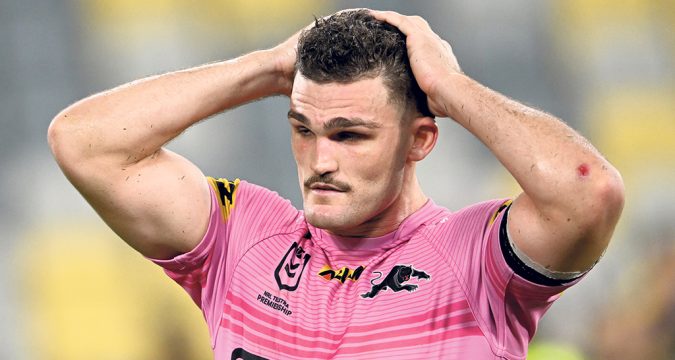The Penrith Panthers, once the NRL’s gold standard and undisputed kings of consistency, find themselves in uncharted territory this season. After a remarkable run that saw them dominate the competition with three straight premierships and a stranglehold on the league’s top echelon, the Panthers are now dealing with a cocktail of issues that have exposed their vulnerability and thrown the balance of power into question.
Penrith’s struggles are not rooted in just one area. They are the result of a slow-burning convergence of factors—some structural, others circumstantial, and many of their own making. The aura of invincibility that once defined them has dimmed, and while the core of their premiership-winning squad still exists, the Panthers are learning the hard way that staying at the top is exponentially harder than getting there.
First and foremost, the loss of key personnel over the past two years has gradually chipped away at Penrith’s depth and cohesion. While the club has done an admirable job at replenishing its roster from within, replacing seasoned stars like Viliame Kikau, Apisai Koroisau, Stephen Crichton, and Matt Burton has proven more difficult than initially anticipated. These were not just role players; they were impact figures who brought match-winning ability, versatility, and invaluable experience to the team. The current replacements, though promising, simply haven’t filled the void with the same authority or consistency.
Then there’s the issue of fatigue—both mental and physical. No team in the modern NRL era has endured the type of high-performance grind that Penrith has since 2020. Multiple deep finals runs, Grand Final appearances, representative call-ups, and World Club Challenge fixtures have stretched this squad thin. For players like Nathan Cleary, Isaah Yeo, and Brian To’o, who rarely miss time and are often called into Origin or international duty, the cumulative toll is beginning to show. Their bodies have been pushed to the limit season after season, and the sharpness that once defined their play is now dulled by wear and tear.
Compounding that fatigue is the absence of their leader, Nathan Cleary. While Penrith has grown accustomed to operating like a well-oiled machine, Cleary is the engine, the navigator, and the clutch all in one. His game management, precision kicking, and ability to control tempo have been irreplaceable, and without him on the field, the Panthers have looked lost at times. His current injury layoff has left a gaping hole not just tactically, but psychologically. Without their general, the side’s confidence and composure have noticeably dipped, especially during high-pressure moments in tight games.
The tactical blueprint that carried Penrith to glory is also beginning to show signs of age. Teams have studied the Panthers intently over the past few seasons, and many have started to crack the code. What once worked seamlessly—their suffocating defense, their relentless yardage game, their back-row creativity—has now been met with better-prepared and more aggressive opposition. Coaches around the league are more daring in how they approach Penrith, often matching their physicality and pressing higher in defense. In short, the Panthers are no longer catching teams off guard, and without tactical evolution, their previously dominant style has started to look predictable.
Injuries, too, have hit at the worst times. Besides Cleary, the Panthers have had to navigate stretches without key contributors like James Fisher-Harris and Dylan Edwards. Their absence, even for short bursts, disrupts the rhythm of a side that’s always relied on cohesion and trust. Penrith’s system is built on understanding—the kind that comes from combinations built over years. Take one or two bricks out of the foundation, and the whole structure begins to shake.
And while Penrith still boasts one of the most formidable forward packs in the game, even that strength has faltered under the weight of expectation and fatigue. Players like Moses Leota and Isaah Yeo continue to give their all, but without the same dominant platform, Penrith’s halves and backs are struggling to capitalize. Opposition teams are meeting them head-on in the middle of the park, often winning the early tackles and halting momentum. The ripple effect is massive—less ruck speed, fewer attacking opportunities, and increased pressure on their kick-chase game.
Off the field, the pressure of sustained success has also changed the dynamic. When you’re the hunted every week, the margin for error shrinks. The Panthers used to play like a team on a mission. Now, they often look like a team burdened by the weight of maintaining a legacy. It’s subtle, but evident: the body language after a dropped ball, the hesitation in decision-making, the frustration when calls don’t go their way. That edge—the defiance that carried them through adversity in years past—feels dulled.
The junior system, once the envy of the league, is still producing talent, but the gap between junior promise and first-grade production is vast. Young guns like Jack Cole and Jesse McLean have had moments of brilliance but are not yet ready to carry the responsibility that comes with stepping into the shoes of champions. Development takes time, and Penrith may be in that painful transition where expectations far outpace where some of their replacements currently are in their journey.
And yet, despite all of this, Penrith isn’t falling apart. They’re still competing. They’re still in the mix. But the air of dominance is gone, replaced by something more human—a reminder that even dynasties are vulnerable to erosion. What made Penrith great was never just their talent. It was the combination of culture, chemistry, coaching, and continuity. Right now, all four are being tested.
Coach Ivan Cleary has been calm and calculated in the public eye, insisting the team will find its groove again. He may be right. Few coaches understand their group better. But internally, Cleary and his staff know they need to adjust. They must evolve tactically and get the best out of a squad that has aged together through wars but is now fighting new battles with less ammo and more scrutiny.
In the bigger picture, the Panthers’ current dip may be necessary. Sustained dominance breeds complacency, both within a club and among fans. Adversity forces reinvention. It demands introspection. Perhaps this rough patch is the spark Penrith needs to retool and recalibrate. Every great club has to reset eventually, and while the Panthers are not in full-blown crisis, they are undeniably at a crossroads.
Whether they reclaim their throne this season or not, Penrith’s legacy remains secure. Three straight titles in the modern NRL is a feat that may never be replicated. But if they want to stay among the league’s elite, they must now prove they can adapt. The league has caught up, and the mountain is no longer theirs alone to stand on.
So why are the Penrith Panthers struggling so much? It’s not one thing—it’s everything. A gradual unraveling of depth, injuries to key players, mental fatigue, tactical stagnation, rising opposition, and the crushing weight of expectations. It’s the price of greatness, paid in full each week. And for now, the kings are bleeding.



